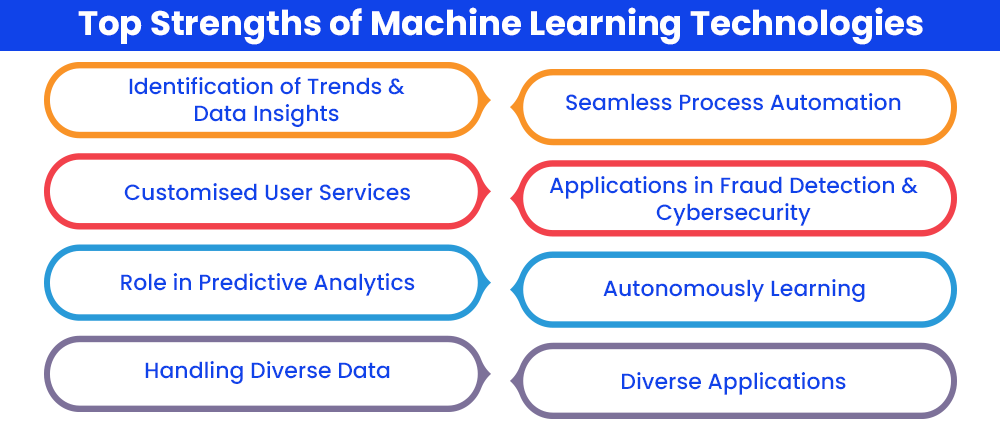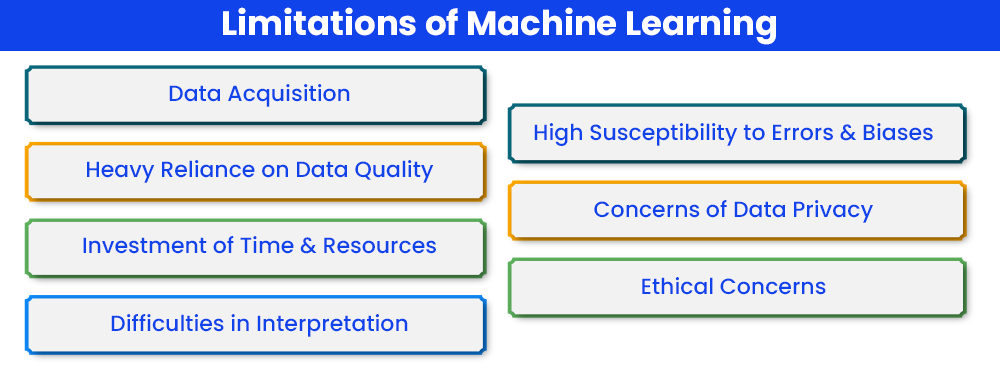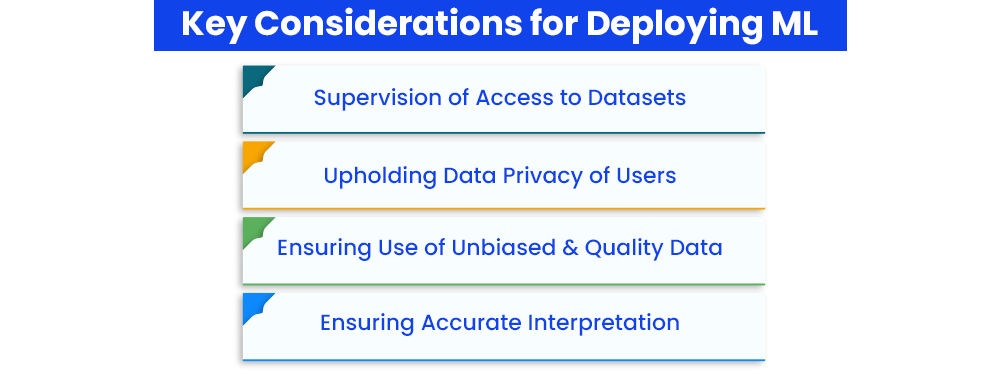Expert Interviews
- University Reviews
- Career Guide
 Video Counseling
Video CounselingImportant Facts
- Ask any Question - CV Forum

Advantages and Disadvantages of Machine Learning [ML] 2026
College Vidya Team Jan 22, 2026 2.4K Reads

With the rise of the widespread applications of artificial intelligence and big data analytics, the role and importance of machine learning, a component crucial to the development of both, has come to the forefront. Like any technological domain, its operations and functioning poses certain challenges and offers certain benefits. AI and related domains have raised important implications, some beneficial for humankind, and others less so, but the transformative power of these technologies has been acknowledged nonetheless.
Similar to the concerns about the advantages and disadvantages of AI, concerns have also been raised about the use and applications of machine learning. Computer scientists and IT professionals have identified the associated pros and cons associated with ML, and in this blog, we aim to provide you with a detailed overview of machine learning and its pros and cons.
Continue reading to understand the nuances of the advantages and disadvantages presented by the machine learning technologies!
What is Machine Learning & Where Is It Used?
Machine learning is a subfield of artificial intelligence that is involved with the analysis of large datasets to draw data-driven insights and further train machine and AI models to make accurate decisions and solve problems efficiently by using those insights. The central focus of machine learning is to make accurate predictions about effective solutions and use those insights and predictions to further guide the functioning of the AI and ML model. In this manner, machine learning uses statistical techniques and systematic algorithms to train AI models and computer software to provide accurate solutions. It is also a major component of big data analytics.
|
|
|
|
|
|
|
|
|
|
|
|
|
|
|
|
|
|
|
|
|
|
|
|
As has already been stated, machine learning primarily finds its uses in the domains of artificial intelligence and data science and analytics. In addition, its applications span areas like cybersecurity, potential fraud detection, training of models, business analytics, natural language processing in chatbots, personalised suggestions to users based on their current preferences, speech and image recognition and so on.
Advantages of Machine Learning
With an overview of machine learning and its applications being provided, here we have elaborated upon some of the most advantageous aspects of this technology that make it a popular domain of AI being put to use to enhance services.

1) Efficient Identification of Trends & Data Insights
The first and foremost advantage or benefit of utilising machine learning technologies is the efficiency with which it is able to spot data patterns and trends, many of which would be difficult to spot by humans. Being equipped to easily manage and interpret vast datasets, ML models can make coherent sense out of data to draw insights useful from a business enterprise perspective as well as for increasing the efficiency of predictions made by the model.
2 ) Seamless Process Automation
As is the case with a large number of technological advancements, ML also presents the benefit of seamlessly automating a large proportion of tasks in organisations. It helps in the automation of data analysis, AI model training and also the performance of repetitive backend tasks. While supervised and semi-supervised machine learning require some degree of human involvement in dataset feeding and training, unsupervised and reinforcement learning technologies are autonomous, helping the model to develop increasingly accurate predictions with time by autonomously learning and strengthening the ML model.
3) Customised Services to Users
One of the primary advantages of integrating machine learning technologies in softwares and machine is the high degree of customisation and personalisation they are able to provide to customers and users of those softwares. The primary mechanism of operation of an ML model revolves around being able to make accurate predictions based on datasets and insights. This technology is used in customer services as well as to provide personalised suggestions to users. For example, the customised playlists suggested and created by musical streaming platforms rely on huge datasets consisting of histories of users’ musical preferences and usage on the application to draw insights and provide suggestions based on those insights. This degree of customisation has been made possible to apply due to the automation and predictive power of machine learning technologies.
4) Applications in Fraud Detection and Cybersecurity
Owing to the efficient capability of identifying trends and patterns in data, ML models find a crucial application in the domain of fraud detection and cybersecurity, especially in sectors of cyber-vigilance and finance. In the financial sectors, such ML models are deployed to track the patterns of financial transactions and exchanges as well as detect any unusual transactions and behaviours which may indicate potential cyber fraud.
5) Role in Predictive Analytics
One of the major functions and purpose of creation of efficient machine learning models and algorithms is for the model to feed on vast amounts of data to come up with accurate predictions. These predictions could pertain to predictive analytics related to effective solutions, potential future trends, demands for products and services, values of services/stocks etc. These predictive analytics make it highly instrumental for business enterprises for guiding business decisions, strategies as well as using ML technologies for customer needs.
6) It Learns Autonomously
An aspect of ML algorithms and models related to its process automation is its ability to train itself and autonomously learn. As the name of the technology suggests, it is used to train and make machines learn smart behaviour on the basis of insights drawn from vast data. Unsupervised and reinforcement learning require minimal human intervention for data inputs and enable the ML model to learn autonomously to function well. In the case of semi-supervised and supervised learning as well, ML models continue to learn autonomously post the provision of labelled data, making its predictions increasingly accurate over time.
7) Well-equipped to Handle Diverse Data
Another major benefit contributing to the widespread integration of AI and ML technologies is such models’ ability to handle a wide variety of datasets, whether it be small data with limited data points or big data with thousands of data points, whether it is labelled or unlabelled data, numerical or textual and categorical data etc. ML technologies are designed to cater such various types of data and efficiently produce insights relevant for interpretation of those datasets.
8) Widespread Applications
Lastly, a major advantage of ML technologies are their widespread applications ranging from crucial domains like cyber fraud detection, security and vigilance in financial and BFSI industries, self-driving cars, stocks price prediction to everyday usage such as customer services, personalised suggestions for video streaming, music and so on.
Disadvantages of Machine Learning
As has been elaborated above, machine learning as a field surely serves functions that make it highly appealing for applications in diverse industries. But it is of utmost importance to be aware of the disadvantages, limitations and potential threats that machine learning can have before such a widespread deployment of such technologies.

Enlisted below are a few of the pertinent concerns surrounding machine learning about its limitations and disadvantages.
1) Difficulties in Data Acquisition & Dependence on Data Quality
One of the primary problems in the very development of machine learning models is the requirement of vast datasets for the model to train from. For instance, for effective training of an ML model, a large dataset consisting of thousands of data points are required. In addition to the size of the dataset, the training of the ML model is dependent on the quality of the data as well, as it contributes to the accuracy and unbiased nature of the interpretations. The maintenance of the quality of data requires regular data cleansing, data updation, ensuring that the data is unbiased, data monitoring and so on, all of which requires significant time and effort.
2) Investment of Time & Resources
The development of ML models is a complex task, and the procedure of creating the model, its operations, monitoring and debugging, all require investment of time and resources such as human resources, infrastructural and technological support, monetary resources etc. Thus, the initial costs associated with the creation and application of ML models can be quite high and hence inconvenient for small enterprises to integrate with their operations.
3) Difficulties in Interpretation
The difficulties associated with the interpretation of complex results produced by machine learning models can be a daunting task for businesses and professionals. Since the results provided by the model can be complex and hence difficult to interpret accurately, it may lead to a creation of distrust on automated models as well as solutions provided by it for business growth. Another major concern to take care of is the utilisation of the right model or algorithm based on the type of dataset used for training and the purpose of the interpretations of the results. All such factors require specialised skills and expertise in machine learning to maximise the potential of these models, thus contributing to the inconvenience associated with the use of such models.
4) High Susceptibility to Errors
A major concern associated with the usage of ML models is their high susceptibility to errors. These errors can occur at multiple levels. While ML models and algorithms are trained to make accurate predictions, there is less emphasis placed on the active applicability of such predictions. This can result in erroneous functioning and outputs by the model, especially if the model is trained on the basis of ineffective, small or unsuitable data. This can lead to the model continuing to train on inaccurate datasets, leading to unuseful and in certain cases, inaccurate predictions and decisions being offered. Moreover, it might lead to biased results being produced by the model, leading to potential ethical concerns as well. Lastly, a major implication of this disadvantage is the difficulty of tracing the error sources in ML models. As such errors have high chances of going undetected for large durations of time, the tracking of the error source is highly tough in such situations.
5) Concerns of Data Privacy
Associated with the widespread application of ML models is the requirement for large and meaningful datasets. The requirement for such large databases and datasets can have potential implications on the security and privacy of user data. In many cases, business ventures and enterprises utilise customer and user data to train such models, creating potential threats to their security and privacy. Unless enterprises and companies are using sufficient safeguards to protect user privacy and cybersecurity, the use of ML models on such datasets poses significant threats to the cyber well-being of users and customers. This is especially true if there is unmonitored access to such datasets and findings, allowing for easy misuse of the data.
6) Impact of Automation
While one can focus on the major benefits of automation to cost-saving and efficiency of functioning, such automation inevitably leads to the redundancy of a number of job roles and impacts human employability, even for complex analytical functions. As a result, this is one of the major concerns associated with the widespread employability of ML models.
7) Ethical Concerns
One of the primary problems associated with the functioning of ML technologies is its susceptibility to amplify existing biases in the training data. When biased or poor quality datasets guide the training of a machine learning model, it can lead to further perpetuation of those biases, which can raise many ethical concerns related to discrimination, stereotyping, data privacy and so on. This is another major disadvantage associated with the application of ML on a widespread basis.
Conclusion: Is Machine Learning Worth the Hype?
Having looked at the various advantages and disadvantages associated with machine learning, it is quite apparent that while this technology holds tremendous potential for transforming the face of artificial intelligence and computer science, it still suffers some significant limitations in its applications and effectiveness in providing solutions.

When used in an unsupervised and insufficient capacity of interpretation, the threats of biased outputs and discriminatory implications surge. As a result, the full potential of ML technologies can only be realised with the creation of more robust models and utilisation of effective datasets that are of high quality.
Trending Articles
|
|
|
|
|
|
|
|
|
|
|
|
|
|
|
|
|
|
|
|
|
|
|
|
|
|
|
|
|
|
|
|
|
FAQs (Frequently Asked Questions)
The major benefits of machine learning include its efficient data analytical capabilities, ability to learn autonomously, applicability on diverse types and sizes of data, capacity for spotting trends, power of automation etc.
Yes, machine learning technologies are highly useful for strengthening the predictive and analytical powers of AI softwares, computer programs and so on. They are also useful in automation of data analysis and autonomous learning by machines and computer programs.
A career in machine learning presents bright prospects, as it is promising not only compensationally but also from a growth perspective. There is a good scope of progressing one’s career to escalate to appealing avenues in AI and ML fields. The average compensation of ML professionals in India ranges from INR 7 LPA to INR 10 LPA based on current statistics.
Some of the major pros of machine learning include its capacity for autonomous learning, predictive power, applications with diverse data types and diverse industries, cyber-fraud detection capabilities etc.
Some of the potential harmful effects of machine learning applications include the propagation of biased and in certain cases, discriminatory data and results, ethical implications for user privacy and data safety, jobs redundancy for humans owing to the automation capabilities of ML models etc.

Idea Alchemist / Concept Creator / Insight Generator
We are an online education platform where users can compare 100+ online universities on 30+ X-factors in just 2 minutes. With an active CV community, we have transformed online learning to quite an extent. With the CV Subsidy scheme, we contributing to GER in India while helping our learners with their finances in their “Chuno Apna Sahi” journey!
Every query is essential.
Our team of experts, or experienced individuals, will answer it within 24 hours.
Recommended for you
Tired of dealing with call centers!
Get a professional advisor for Career!
LIFETIME FREE
Rs.1499(Exclusive offer for today)

Pooja
MBA 7 yrs exp

Sarthak
M.Com 4 yrs exp

Kapil Gupta
MCA 5 yrs exp
or



Career Finder
(Career Suitability Test)
Explore and Find out your Most Suitable Career Path. Get Started with our Career Finder Tool Now!
ROI Calculator
Find out the expected salary, costs, and ROI of your chosen online university with our free calculator.
